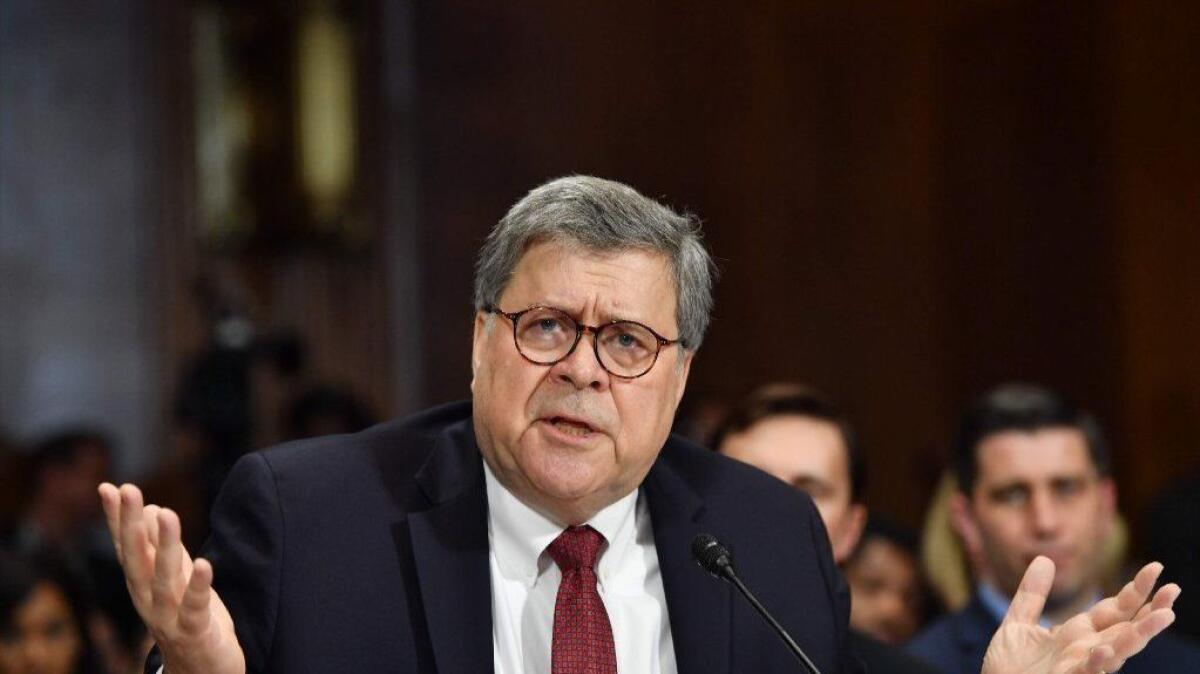Panel votes to hold Barr in contempt; Trump claims executive privilege on Mueller report

Reporting from Washington — Tensions between the White House and Congress boiled over Wednesday after President Trump asserted executive privilege to block release to lawmakers of the special counsel’s unredacted report, and a House committee voted to hold Atty. Gen. William Barr in contempt.
The high-stakes brawl marked a major escalation of a legal and political fight that has few parallels since the Watergate era. The disputes are almost certainly headed to court.
“We’ve talked for a long time about approaching a constitutional crisis,” Rep. Jerrold Nadler, the New York Democrat who chairs the House Judiciary Committee, said after the contempt vote. “We are now in it.”
Adding to the turmoil, the Republican-led Senate Intelligence Committee has issued a subpoena to Donald Trump Jr., the president’s eldest son, as part of its investigation of Russian interference in the 2016 election.
The first known congressional subpoena of one of Trump’s children was issued recently, reportedly because he refused to appear a second time to answer questions, but its existence became public only on Wednesday. Trump Jr. also had refused to testify voluntarily to the special counsel’s office.
The House Intelligence Committee jumped into the fray, subpoenaing Barr to hand over all counterintelligence and foreign intelligence materials produced by the Mueller probe as well as the unredacted report and underlying materials.
The Justice Department “has responded to our requests with silence and defiance,” tweeted Rep. Adam B. Schiff (D-Burbank), the committee chairman. “Congress needs the material. We will not be obstructed.”
The day’s dramatic events began when the White House said Trump had asserted executive privilege — for the first time since he took office in 2017 — to block release to Congress of special counsel Robert S. Mueller III’s unredacted report and evidence.
Hours later, the Democratic-led House Judiciary Committee voted to hold Barr in contempt of Congress for defying a subpoena to hand over the material. The 24-16 vote was along party lines.
If the full House approves the resolution, Barr will be the nation’s second top lawman to face that sanction.
Mueller’s office had considered charging Trump Jr. with violating campaign finance laws for accepting a meeting in June 2016 with a Kremlin-tied lawyer who, he was told, would provide incriminating information on Democratic candidate Hillary Clinton. Prosecutors ultimately decided they had insufficient evidence.
Trump Jr. also faced scrutiny for his role in secret election-year efforts to build a luxury skyscraper in Moscow, a proposal that was abandoned after Trump secured the GOP nomination.
The subpoena by the Republican-led committee, first reported by Axios, put Senate Majority Leader Mitch McConnell in an awkward position. On Tuesday, he declared “case closed” on the Russia investigation and urged Congress to move on.
House Democrats pressed ahead despite being stymied by the White House. As the Judiciary Committee hearing began, the Justice Department released a letter from Assistant Atty. Gen. Stephen Boyd to Nadler that said Trump was making a preliminary claim of executive privilege.
The step serves as a placeholder, giving the president time to review the materials and consider a more definitive attempt to block congressional access to specific documents.
White House spokeswoman Sarah Huckabee Sanders told reporters that Trump had “no other option” but to assert executive privilege to counter what she called Nadler’s “blatant abuse of power.”
The White House previously threatened to invoke executive privilege to restrict testimony on Capitol Hill by former officials, but the letter marked Trump’s first formal assertion of the legal principle that allows presidents to keep private communications with advisors.
Mueller’s report relies heavily on interviews with current and former senior staff in the White House, most notably former chief counsel Donald McGahn. The White House had allowed them to speak with the special counsel’s office and did not assert executive privilege over the redacted report that was released to the public on April 18.
Mueller’s report concluded that the Trump campaign did not illegally conspire with Russia in the 2016 election. It also laid out “substantial evidence” that the president tried to obstruct the probe but reached no conclusion on whether he had violated the law.
Barr said the facts did not show Trump committed a crime, a conclusion that Democrats have contested.
Lawyers for the Justice Department and the special counsel’s office redacted about 10% of the 448-page report before its public release, and House Democrats say they need to inspect the censored material.
Experts said the contempt resolution and the executive privilege claim underscored how quickly relationships had deteriorated between House Democrats and Trump, who has pledged to fight “all the subpoenas.”
“Usually you negotiate for months and months,” said John Yoo, a UC Berkeley law professor who has worked for the Senate Judiciary Committee and President George W. Bush’s Justice Department. “They’re immediately going to the walls of their castles, and they are quickly escalating.”
In addition to battles involving the Russia investigation, Democrats have accused the Trump administration of stonewalling their inquiries into the president’s taxes and handling of security clearances for several White House aides, including Trump’s son-in-law, Jared Kushner.
“What is the Trump administration hiding from the American people?” said Rep. Ted Lieu (D-Torrance) during the Judiciary Committee hearing Wednesday. “Because the administration is not just stonewalling this committee. They’re stonewalling every committee’s request for information.”
Rep. Doug Collins of Georgia, the committee’s top Republican, said Democrats were seeking more documents because they were unhappy that Mueller didn’t find a case for impeaching the president.
“We think we’re going to find out something more than he found out?” Collins said. “Come on. We’re manufacturing a crisis, and that’s why we’re here.”
Republicans also said Barr was following the law by refusing to turn over the unredacted report, which includes grand jury evidence that is required to be kept under wraps.
They pointed to Boyd’s letter to Nadler, which said Barr “could not comply with your subpoena in its current form without violating the law, court rules, and court orders, and without threatening the independence of the Department of Justice’s prosecutorial functions.”
Nadler disagreed, saying he wanted to work with Barr to ask a judge for permission to have access to the grand jury material.
A full House vote on the contempt resolution could be averted if committee staffers and Justice Department officials can reach a compromise. But that appeared unlikely after the White House’s announcement on executive privilege gave Barr more legal grounds to resist.
House leaders haven’t decided when the contempt resolution will come to the floor, according to Majority Leader Steny H. Hoyer (D-Md.). He accused the Trump administration of participating in “perhaps the greatest cover-up of any president in American history.”
Hoyer indicated Democrats were willing to be patient if contempt proceedings against Barr end up in a lengthy legal battle, which could extend into 2020 and become a campaign issue.
“If it takes a year and a half, that’s a relatively short period of time in the course of the history of our country,” Hoyer said.
There’s precedent for similar court fights to last far longer.
In 2012, Atty. Gen. Eric H. Holder Jr. became the first sitting Cabinet member to be voted in contempt by the GOP-controlled House in a battle over access to Justice Department records on a failed gun-tracking operation called “Fast and Furious.” The legal battle lasted for years after Holder left his position.
“We still don’t have all the documents,” said Rep. Debbie Lesko (R-Ariz.) — a reminder of how such disputes rarely have tidy or timely ends.
Times staff writer Jennifer Haberkorn contributed to this report.
More to Read
Get the L.A. Times Politics newsletter
Deeply reported insights into legislation, politics and policy from Sacramento, Washington and beyond. In your inbox three times per week.
You may occasionally receive promotional content from the Los Angeles Times.











